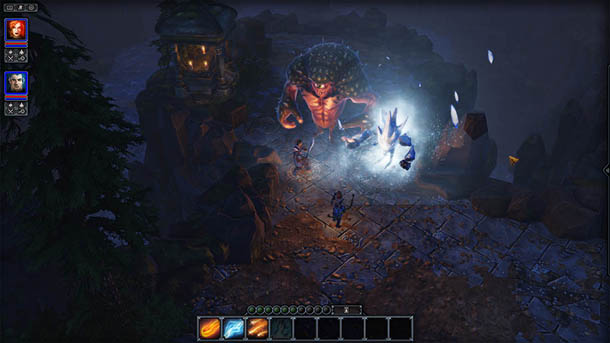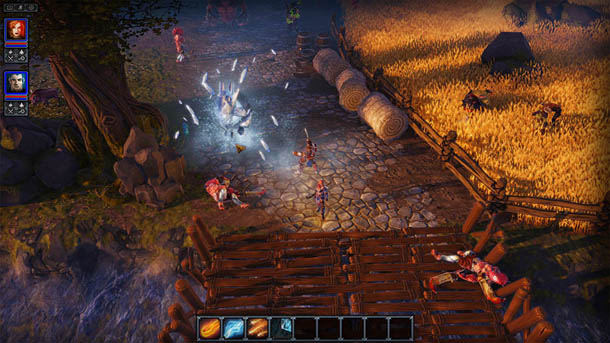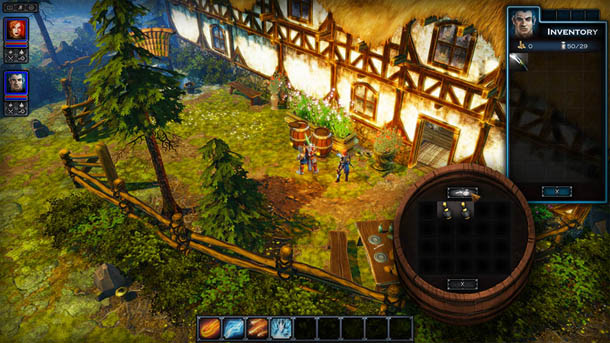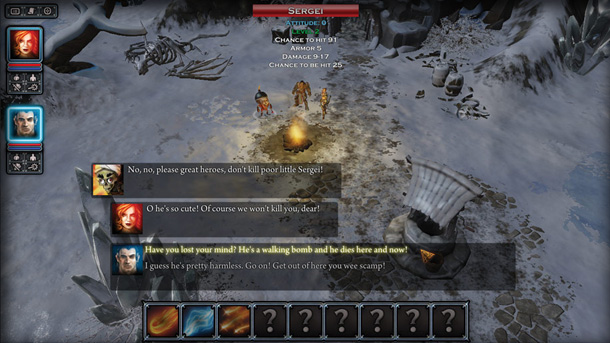
After falling deep into the Diablo III rabbit hole, I’ve been a sucker for dungeon-crawling action RPGs. From Torchlight to Heroes of Ruin, I’ve sought out games of the genre on virtually every platform I could find. For the most part, apart from a few mechanical or graphical differences, the games are mostly the same: wizards, barbarians, lots of grinding, and Skeleton Kings.
That’s why when I had the opportunity at a recent event to see the latest developments in Larian Games’ Divinity: Original Sin I wasn’t expecting to be blown away.
When I left the demo I still wasn’t blown away, but that wasn’t necessarily a bad thing: Original Sin is a comfortable experience within the genre, and one that gives us its entire toolset to play with and make the experience more personalized.
As with the other Divinity game I had the chance to check out recently, Original Sin takes place within the canon of the series’ world, but enters it from a very different angle. In the world’s timeline it takes place at the very beginning, before any of the other games in the series. Where Ego Draconis was a more traditional RPG and Dragon Commander a mish-mash of styles, Original Sin is an isometric action/turn-based RPG. Larian Games clearly likes to mix it up each time a new game is released.

The game is heavily inspired by Divine Divinity, one of its predecessors that also utilized the action RPG genre. Visually, it’s heavy on detail and low on repeating elements. All of the trees, fences, and even barrels seemed different than the others on the screen, and the various NPCs were unique and creatively designed. It’s also much more colorful than what Blizzard offers, with a lighter color palette thanks to much of the game taking place outdoors in the sun. Shadows are cast at different lengths depending on the size of the object, and light bounces off of both glossy and matte surfaces. It’s very pretty.
Four players can take the game on together, with drop-in/drop-out multiplayer. When not playing with other humans, the computer takes over the AI, with the ability for the player to manually assign moves on a micro-management level.

The demo we were a part of focused heavily on another aspect of Original Sin, one which other games in the genre tend to skip past or downplay: the narrative. OS is heavily plot-driven, with quests being much more than just heading into a cave to retrieve a crown or crystal shard. For one, players can talk their way out of combat if using the right combination of party members and responses based on the character’s stats.
In one quest, the hero was asked to hunt down a character named Robert who is charged with adding mechanical enhancements to undead creatures, something that the local townsfolk are highly dissatisfied with. Robert was last seen with one of the town’s women, who has now gone missing. Stopping be her home reveals that she’s been held hostage by a zombie suicide bomber. Because the hero’s stats didn’t jive with what the kidnapper wanted, he was put to an explosive end. It’s then revealed that Robert is actually a monster in disguise who seduces women, and after a night of passion leaves them with a skeleton bomber in the morning to blow the women apart, harvesting the parts for his undead army.
It’s pretty bonkers for a plot but it’s charming as hell. Every game has a demon lord, but how many have us hunting down perpetrators of one night stands? Sure, the focus on plot diverts the attention away from the other more traditional gameplay elements, but it’s refreshing to feel as though there is a thread binding together all of the clicking we’ll be doing.

During the demo the developers also showed us the world editor, a fully-realized creation tool that is essentially the same that the team used to create the main game. The tools allow players to build maps, develop characters, and even create entire dialog strings and storylines. It’s a modding fanatic’s dream, and one that the team hopes will lead to players sharing their creations with each other and staying with the software for far longer than the length of its quest.
With the tools to create essentially anything in the game world, and a narrative focus that delivers a fun, often light-hearted experience, Divinity: Original Sin might be the perfect compliment to some of the heavier action RPGs on the market.
Divinity: Original Sin launches in 2013 on PC

No Comments